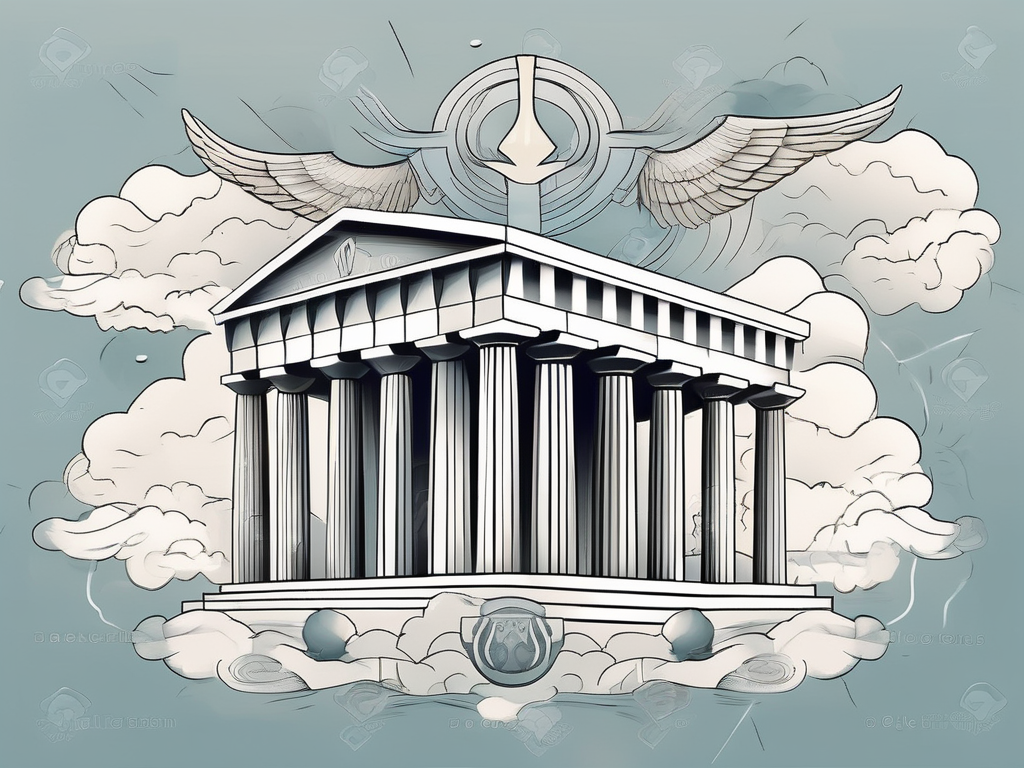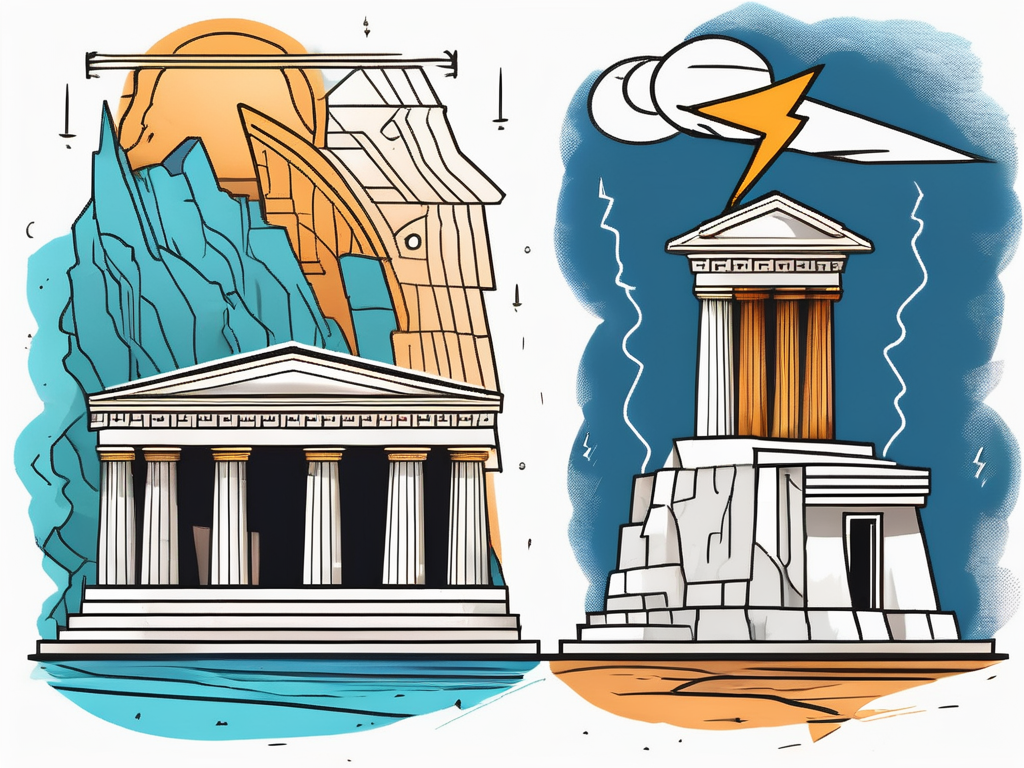Ah, Greek mythology, a world filled with fascinating tales and awe-inspiring deities. Among the gods and goddesses that capture our imaginations, there is one enigmatic figure that stands out – the Greek goddess. In this article, we will embark on a journey to unravel the mysteries surrounding these mythical beings and explore their significance in Greek mythology, literature, art, feminism, and even modern pop culture.
Understanding the Concept of Greek Goddesses
Before we delve into the depths of Greek goddesses, it’s important to grasp the concept behind them. Greek mythology portrays goddesses as powerful beings, often representing different aspects of life. They embody various traits, from beauty and wisdom to fertility and war. But their role goes beyond mere symbolism.
The concept of Greek goddesses is deeply rooted in the ancient Greek culture and society. These divine female figures were not just mythological characters, but rather integral parts of the Greek belief system. They were revered and worshipped by the ancient Greeks, who believed that these goddesses held immense power and influence over their lives.
One of the key aspects of Greek goddesses is their ability to personify different aspects of life. Each goddess represents a specific domain or sphere, and through their actions and stories, they provide explanations for natural phenomena, cultural traditions, and human experiences. For example, Demeter, the goddess of agriculture and fertility, was believed to be responsible for the growth of crops and the abundance of the harvest.
The Role and Importance of Goddesses in Greek Mythology
Within Greek mythology, goddesses hold immense importance. They are not just mythological figures, but crucial characters in tales that explain natural phenomena, cultural traditions, and human experiences. With their powers and complexities, goddesses bring depth and richness to the stories that have captivated generations.
The role of goddesses in Greek mythology extends beyond their individual stories. They often interact with other gods and goddesses, shaping the course of events and influencing the lives of mortals. For instance, the goddess Hera, known as the queen of the gods, played a significant role in the Trojan War by favoring the Greeks and opposing the Trojans.
Moreover, goddesses in Greek mythology are not just passive beings. They possess agency and make their own decisions, sometimes defying the expectations of both gods and mortals. This adds complexity to their characters and makes them relatable to human experiences, despite their divine nature.
The Symbolism Attached to Greek Goddesses
Each Greek goddess carries a unique symbolism, helping us understand her qualities and influence on the world. Aphrodite, the goddess of love, beauty, and desire, represents the eternal allure and power of passion. Her beauty and charm captivate both gods and mortals, making her a symbol of desire and romantic love.
Athena, the goddess of wisdom and strategy, embodies intellect and resourcefulness. She is often depicted with an owl, a symbol of wisdom, and is known for her strategic thinking and tactical prowess. Athena’s symbolism reminds us of the importance of intelligence and cunning in overcoming challenges.
These symbols enable us to connect with the goddesses at a deeper level and appreciate their significance. They serve as reminders of the qualities and virtues that the ancient Greeks valued and sought to emulate in their own lives.
The Enigma of the Greek Goddess: An Overview
Step into the realm of mystery surrounding the Greek goddess, and be prepared to be captivated by their allure. These mesmerizing beings have long fascinated scholars, artists, and enthusiasts alike.
The Greek goddesses, with their ethereal beauty and enigmatic nature, have captivated the imaginations of countless individuals throughout history. From the alluring Aphrodite, the goddess of love and beauty, to the wise and strategic Athena, the goddess of wisdom and warfare, each goddess possesses a unique set of qualities that make them both intriguing and powerful.
The Mystery Surrounding the Greek Goddess
Despite the abundance of tales and references to Greek goddesses, there is an inherent enigma surrounding them. Their origin stories often intertwine with other deities, creating intricate webs of genealogy. Unraveling these complex relationships adds to the enduring allure of the Greek goddesses.
One of the most intriguing aspects of the Greek goddesses is the mystery surrounding their birth and lineage. Many of them were born from unusual circumstances, such as Zeus, the king of the gods, giving birth to Athena from his own head. These mythical tales not only add to the mystique of the goddesses but also highlight their divine origins and extraordinary powers.
The Power and Influence of the Greek Goddess
One thing is certain – the Greek goddesses hold immense power within the mythological tales. From shaping the outcome of wars to steering the course of romantic entanglements, they wield authority over both mortals and gods alike. Their influence is a testament to the weight they carry within the Greek pantheon.
One of the most notable examples of the power of the Greek goddesses is seen in the Trojan War. The goddesses Athena, Hera, and Aphrodite played pivotal roles in the conflict, each using their unique abilities to influence the outcome. Athena, with her strategic prowess, guided the Greek heroes to victory, while Aphrodite’s seductive charms caused discord among the Trojan ranks. Hera, the queen of the gods, used her influence to sway the course of events in favor of the Greeks.
Furthermore, the Greek goddesses were not limited to their roles as divine beings. They also had a significant impact on mortal lives. Aphrodite, for example, was known to bestow her blessings upon lovers, ensuring their unions were filled with passion and desire. Similarly, Artemis, the goddess of the hunt, protected hunters and guided them in their pursuits.
In conclusion, the Greek goddesses continue to captivate and intrigue us with their mysterious nature and immense power. Their stories and influence have left an indelible mark on art, literature, and popular culture. Exploring the depths of their mythology reveals a rich tapestry of enigmatic beings who have shaped the world of ancient Greece and continue to fascinate us to this day.
The Greek Goddess in Literature and Art
As timeless figures, Greek goddesses have made their mark not only within myths but also in the realms of literature and art, inspiring countless masterpieces.
These powerful female deities have left an indelible mark on the world of ancient literature. From Homer’s epics to Greek tragedies, their divine nature and intricate personalities are showcased in vivid detail. In the epic poems of Homer, such as the Iliad and the Odyssey, goddesses like Hera, Demeter, and Artemis play pivotal roles, influencing the outcomes of battles and the fates of heroes. These written accounts offer glimpses into the minds of ancient civilizations and their reverence for these awe-inspiring figures.
Furthermore, Greek playwrights such as Euripides and Aeschylus brought the goddesses to life on the stage. In tragedies like “Medea” and “The Oresteia,” the goddesses’ power and complexity are explored, revealing their influence over mortal lives and the consequences of defying their will. These plays not only entertained audiences but also served as a reflection of the societal values and beliefs of ancient Greece.
The Greek Goddess in Classical and Modern Art
The allure of Greek goddesses has captivated artists throughout history. In the world of classical art, these divine beings were immortalized in sculptures that depict them in all their grandeur. The marble statues of goddesses like Aphrodite, Athena, and Hera stand as testaments to the skill and craftsmanship of ancient Greek sculptors. These sculptures, with their intricate details and lifelike qualities, continue to awe and inspire viewers to this day.
However, the influence of Greek goddesses extends far beyond the classical period. In modern art, their presence can still be felt. Artists continue to draw inspiration from these mythical figures, incorporating their symbolism and archetypal qualities into their works. From paintings to installations, contemporary interpretations of Greek goddesses bring both traditional elements and fresh perspectives to the forefront. These modern representations explore themes of femininity, power, and spirituality, offering new insights into the enduring significance of these goddesses in our collective imagination.
Whether in ancient literature or in the world of art, the Greek goddesses continue to captivate and inspire. Their stories and images serve as a reminder of the timeless power and beauty that these mythical figures embody.
The Greek Goddess: A Feminist Perspective
In the realm of feminism, the Greek goddesses have become symbols of empowerment and a source of inspiration for those seeking to redefine gender roles.
The Greek Goddess as a Symbol of Feminine Power
Greek goddesses challenge conventional notions of femininity. They exhibit strength, intelligence, and agency, breaking free from the damsels-in-distress archetype. The goddesses empower individuals to embrace the multifaceted nature of womanhood and celebrate their unique strengths.
The Greek Goddess and the Concept of Female Divinity
Within modern feminist spirituality, the Greek goddesses have found a place as embodiments of female divinity. They provide a lens through which individuals can explore the sacred feminine and its role in the world.
The Greek Goddess in Modern Pop Culture
Even in our modern world, the Greek goddesses continue to capture our imagination, permeating popular culture and leaving a lasting impact.
The Greek Goddess in Movies and Television
From “Wonder Woman” to “Percy Jackson,” the Greek goddesses have become prominent fixtures in films and TV shows. Their stories intertwine with contemporary narratives, captivating audiences and reminding us of the timeless allure of these mythological figures.
The Greek Goddess in Literature and Comics
Authors and comic book artists have also embraced the Greek goddesses, weaving their tales into modern works. These reinterpretations breathe new life into ancient mythology, exposing new audiences to the captivating world of the Greek goddesses.
Unveiling the Enigmatic Greek Goddess
In conclusion, the enigma surrounding the Greek goddesses persists, their allure enduring through the centuries. From their role in Greek mythology to their presence in literature, art, feminism, and popular culture, these powerful beings offer glimpses into the richness of the human experience. So, let us immerse ourselves in the world of the Greek goddesses and allow their enchantment to captivate our imaginations.












